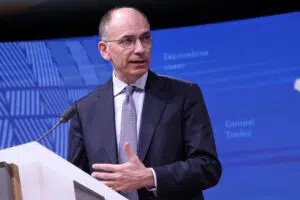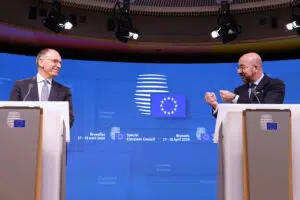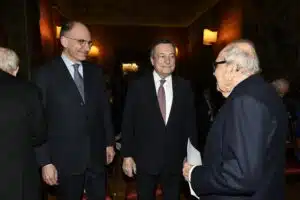Brussels – There will be a close discussion tomorrow morning (April 18) at the European Council, and one that will have a special guest, the Italian former Prime Minister Enrico Letta. After seven months of work and hundreds of meetings and talks in all EU member countries, the report on the future of the Single Market is ready to open the path toward defining priorities for European competitiveness in the short, medium, and long term, starting precisely from what the appositely appointed rapporteur from the EU institution outlined. “I will strongly emphasize that this was a collective work from the bottom up to outline the common and most heartfelt lines,” Letta explained today (April 17) at a joint press conference with European Council President Charles Michel, where the value of the report was highlighted: “It is the last window of opportunity to end fragmentation and act together.”

Energy, defence, telecommunications, and the financial sector are the pillars of the future of the Single Market, as indicated by the report, which represents the first working basis on the macro-topic of boosting European competitiveness. “They will have an impact on the immediate European agenda and on the Strategic Agenda” 2024-2029 (expected at the European Council in June), Letta confirmed, speaking in particular of the fact that “the integration of the Single Market into the financial market can be a game-changer in the debate that we have been carrying on for more than a decade.” In other words, “the financial market should be integrated and efficient,” leveraging only what “starts from factual reality and is feasible” to address “the biggest challenge” on the European Union’s horizon: “Financing the Transition”. The heart of the report is precisely the financial instruments that can be grounded for this goal: “We Europeans are also capable of putting together a toolbox of instruments that can respond to the challenges and finance the green and digital transition.”
The urgency of the issue is apparent, and no doubt the Italian ex-premier will remind the heads of state and government of the 27 member countries: “We have reached a point where we are no longer in a position where we can afford to wait; after years of crisis we are at a crossroads for our economy.” So much so that—joking, but not really—Letta explained to reporters that “the goal is that this report does not end up in the drawer,” as happened to the one presented in 2010 by another former Italian prime minister, Mario Monti. Just remember that the US “is the same size as us,” but “if they have a market that works better, we are the ones who have a problem.” This is where the need to respond starts, “not by becoming the United States, but as a European Union that we are not today in many areas.” One example out of all, telecommunications: “In medio stat virtus, among hundreds of operators [in the EU, ed] and only three [in the United States, ed] there is a lot of room to find a good compromise for consumers, without creating a business disaster,” is Letta’s exhortation. Who ultimately recalled the report’s “mantra” that will influence the chapter New Pact for European Competitiveness of the conclusions of the EU leaders’ summit: “The Single Market must be for everyone and must speak to every citizen and business.”

From left: the head of the report on the future of the Single Market, Enrico Letta, and the President of the European Council, Charles Michel (April 17, 2024)
Confirming high hopes toward the “gigantic and high-quality work” is the president of the European Council, who, alongside Letta at the press conference, reiterated how the Single Market is “a key asset” in addressing challenges for the Union and its member countries: “Climate change, digital revolution, investment in defence and security, demographic challenges.” Michel emphasized the “great progress in recent decades with positive consequences for citizens across Europe,” but he also called the 27 heads of state and government to responsibility in tomorrow’s discussion: “We need to be lucid about the state of the art and what we need to do in the future,” because “numbers are numbers and we know there are gaps in terms of innovation and investment compared to our partners and competitors.” The Letta report will thus provide “guidelines for the months and years ahead,” even given the ongoing work on Strategic Agenda 2024-2029 that, in President Michel’s intentions, should end with adoption “at the European Council in June”.
From the Letta report to the Draghi report
According to various sources in Brussels on the eve of the presentation of the Letta report, there is particular interest in the realization of the necessity to make an “enormous”amount of investment if the goals of the twin digital and green transitions are to be met and combined with other priorities, such as the future enlargement of the Union. There is a great deal of interest in the issue of financing that, as in the Draghi report, contemplates not only the public sphere but especially the private one, with thoughts on how to promote the Capital Markets Union. In other words, everything points to a convergence of the two reports not only in the Strategic Agenda for the next legislature but especially in what will be the pillars of the next multi-year EU budget (2028-2034), given the fact that the sources report “a concrete opportunity” to create a stable floor for discussion on the goals and priorities for the long-term future of the twenty-seven (or more) countries.

From left: former Italian Prime Ministers Enrico Letta and Mario Draghi, respectively, responsible for the high-level report on the future of the Single Market and responsible for the report on the future of European competitiveness
What will begin tomorrow morning is a path marked by three moments: the report on the future of the Single Market, the definition of the Strategic Agenda 2024-2029, and finally, Draghi’s report on the future of European competitiveness. Sources specify that the appointment with the former governor of the European Central Bank for the presentation of the report has not yet been formalized. Still, it will be, in any case, after the June 6-9 European elections, thus at the earliest at the June 27-28 EU leaders’ summit. “What I will propose is a radical change; that’s what we need,” anticipated for the first time yesterday (April 16) Draghi himself, in his speech at the High-Level Conference on the European Pillar of Social Rights, outlining the general lines on which the work is being set up: “We focus on ten macro-sectors of the European economy” with “three common threads”, namely scalability, public goods, and supply of essential resources.
English version by the Translation Service of Withub







